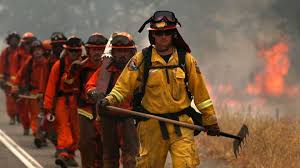Columnist Jana Duncan
Firefighters are heroes. But what about the hardworking firefighters who are also prison inmates?
According to SFGate, 3,800 incarcerated men and women in California serve as firefighters, making up 13 percent of the state’s firefighting force. Each convict who chooses to put themselves in the front lines of firefighting earns $1 per hour fighting fires and $2 per day at the conservation camp which they spend the year at when not fighting fires. Low safety risk inmates make up this fighting force, all of whom applied and trained to earn this coveted position. Their main task, according to Bill Sessa, spokesperson for the California Department of Corrections and Rehabilitation, is to cut firebreaks or mow down the brush to stop, slow down or change the fire’s direction. These are not the men and women seen driving fire trucks, riding in helicopters or seen on television.
Because the state uses these inmates for more laborious tasks, many argue that the miniscule wages they earn are enough to constitute slavery.
One candidate for lieutenant governor of California, Gayle McLaughlin, calls this practice abusive. McLaughlin argues that while the program is beneficial, such low wages must constitute slave labor.
It’s true that for the tasks being done as a service to the community, $1 is astoundingly low. It’s also a fact that while inmates, according to The New York Times, are earning $500 a year, a civilian firefighter’s wage is $40,000 a year. However, does this mean that, as Gayle McLaughlin would argue, felons deserve the same civil rights as any civilian?
McLaughlin addresses a positive note of the program, being that it is extremely beneficial for inmates looking to learn new skills and make a better life for themselves, as they gain experiences they can take with them when they get out of prison.
There are wonderful opportunities to be gained by having this program. Not only does this job provide concrete firefighting training for inmates, it also provides an environment where prisoners can learn teamworking skills, gain a sense of respect and learn to have a different outlook on life.
According to CNN, convicts can shave time off their sentences for their work as good behavior, and at a faster rate than other inmates. The program lowers recidivism, which is the likelihood that criminals will commit another crime once out of jail.
When examining the chances and choices these felons are given through this work program, it seems they are earning much more than what is simply given to them in cash. Sure, the wages are low and the conditions are life-threatening; that fact is not taken for granted. But there is a wide gap between viewing convicts as slaves versus equal citizens who have not committed a crime.
Being paid $1 an hour for risking your life and working harder than many people have ever worked is abysmal, but not completely without reason. People who go to prison, tend to be guilty. Some may argue that the justice system is unjust and that those in the system do not deserve such little respect. However true this may be regarding the justice system, that doesn’t erase the transgressions of people who really did commit crimes against other human beings.
We put people in prison as a punishment and to learn from their mistakes. There are sometimes unfortunate circumstances that put people on the wrong path and into prison, but this doesn’t mean they are blameless.
This firefighting program is a choice. Prisons force no one into it and results for those who do choose to use their time in a positive way is life changing.
This doesn’t mean that $1 is necessarily fair. For such an arduous task requiring 72 hour shifts at times, inmates deserve to earn what they work for. A constructive middle ground could be to place earned money towards funds for inmates when they make their transition into society. It does not have to be slavery against equality, it can simply be doing what is fair and best. As for the unsung heroes of this contained fire, it is important to remember that they too are deserving of our thanks.




































